Overcoming stigma so she can 'speak' for the deaf
MALAYSIANSKINI | Growing up as a hearing child in a deaf household, it didn't take long for Goh Soo Leng to find herself in the role of an unofficial interpreter for her parents.
Trips to the bank would see Goh accompanying her father, as she was tasked to be his ears.
At home, Goh said, most of her time was spent alone, although she recalled how her late grandmother and uncles, who played the roles of "substitute parents" to her and her two other siblings, would often dish out scoldings and reminders for them to behave.
In a recent Skype interview with Malaysiakini, the bubbly 41-year-old opened up about her unique self-identity, shaped by a journey through languages.
Unlike some Chinese Malaysians, Goh described herself as a "banana" who identified herself more with the deaf culture, rather than skin colour or her cultural heritage.
So much so that as an adult, trips back to her hometown during Chinese New Year would see Goh spending more time with her deaf relatives instead of the ones who can hear.
"They are very noisy," she quipped.
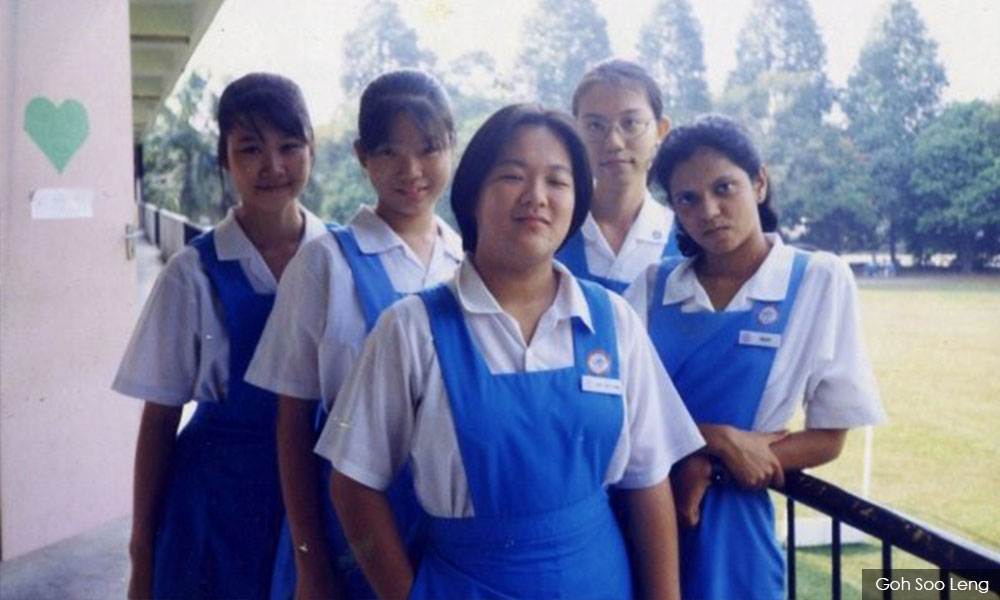
Goh said she was first taught the basics of sign language as a way to communicate with her deaf parents, as well as with several other extended family members.
It was only in primary school, and later at university, that Goh was formally exposed to the national language, as well as English - both of which she has now mastered - aside from retaining a smattering of Cantonese words she picked up through conversations with her relatives and childhood friends.
"The language journey started with signing, Cantonese, Malay and then English," she said.
In her early years, Goh admitted to being embarrassed about her parents' condition, and she kept it a secret not only from friends at school but also from all of the teachers.
"My parents never came to school to collect my report cards.
"Every year, I just gave excuses, telling my teachers that my parents were working and they're busy," she recalled.
Just like any spoken language, sign language is unique to each country and Goh said she joined the Kuala Lumpur Society of the Deaf in 2000 at the age of 21, both as a volunteer and to enrol in a class that taught the Malaysian Sign Language.
It was then that Goh said she finally found the courage to open up and share about her family background, after reading an article about similar experiences faced by "children of deaf adults" in the United States.
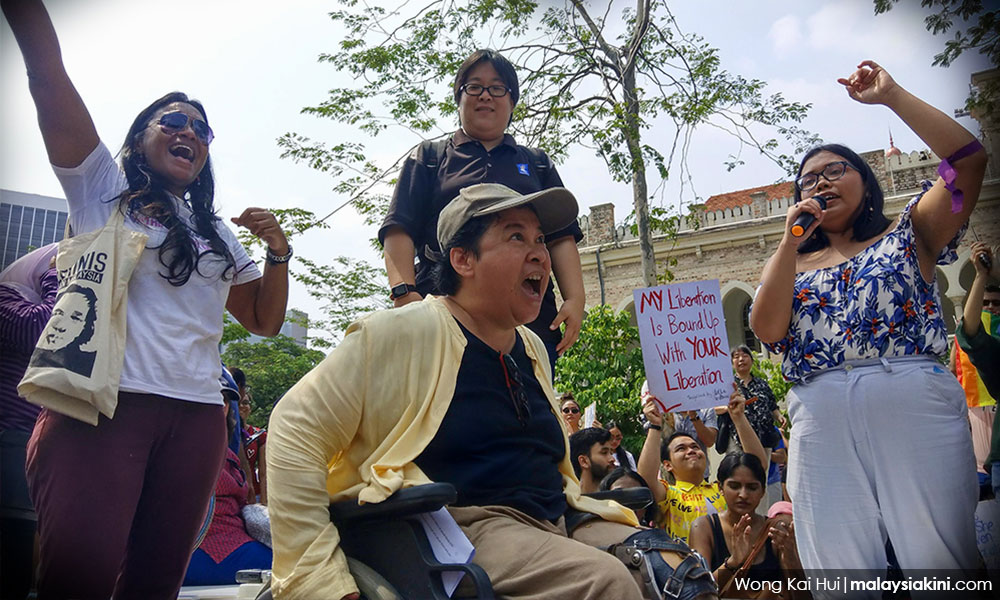
After two years of volunteering, Goh formally signed-up to work as a full-time interpreter at the Malaysian Federation of the Deaf (MFD), a job which she dearly loves and has held on to until today.
Limited resources and a need to come up with new signs that explains newly coined words and terms - for example, to deliver information on the current ongoing Covid-19 pandemic - are just a few of many challenges that Goh managed to overcome in her years of being hired to interpret at numerous private and public functions.
Overall, there are fewer than 100 sign language interpreters in the country despite a growing demand for their services, with the Welfare Department's latest statistic registering 38,675 deaf individuals nationwide.
Goh regrets that there is no position for sign language interpreters in the civil service, meaning that if a government function requires a sign language interpreter, they will get from the MFD, rather than the interpreter being a fully-employed civil servant.
This is Goh's story, in her own words:
I NEVER INFORMED PEOPLE ABOUT MY PARENTS, so they didn't know. It was not a lonely feeling but more like this feeling of 'why are my parents deaf when other people's parents are talking?' I felt more insecure.
I only started to open up and tell people 'hey, my parents are deaf' when I started working with the MFD.
I LEARNT A LOT ABOUT HOW WE ACCEPT DEAF PEOPLE and how people see deaf people... but we fight for them, we fight for their rights. Also, things have begun to open up now in the sense that people are beginning to accept sign language and more people want to learn sign language.
THE MFD ORGANISES NATIONAL LEVEL EVENTS LIKE SEMINARS AND WORKSHOPS. Right now MFD is not just promoting Malaysian Sign Language, but we offer sign language interpreting services for the public and deaf participants.
We also have pre-schools and kindergartens for deaf children, as well as a social enterprise with two cafeterias called "Selera Jemari" in Puchong and Putrajaya.
PEOPLE ALWAYS ASK QUESTIONS ABOUT THE DEAF. "Can they read? Can they write?" So when I'm doing interpreting work, a part of it is that I assist the deaf in the sense I have to explain to others who deaf people are, what are their rights are.
I learnt through my experience, so I can tell the people. Who can become a spokesperson for the deaf? Not us, but the deaf themselves. We will just be there to assist because we are the bridge of communication between the deaf community and the hearing community.
We are the intermediary and middle person for the deaf, but we don't speak for them. Let them speak and we interpret.
WHY NOT LEARN SIGN LANGUAGE? You are not just learning the language, you are learning a culture.
Why not use messaging services? Let's say you want to interview a deaf person, you will need someone like me to interpret. Yes, you can use WhatsApp or other messaging services, but that is one-way communication because you ask a question and you have to wait for the person to answer you back.
With an interpreter, the communication will be smooth.
AS INTERPRETERS, WE DO NOT CREATE SIGNS FOR THE DEAF COMMUNITY. They will discuss and they say, 'okay, this is the sign'. For example, tsunami. How do you give the sign of a tsunami?
We know tsunamis happen in East Asia, especially in Japan, and it is like a wave coming towards the beach.
But coronavirus is different. When it first started, we had to sign each letter, C-O-R-O-N-A-V-I-R-U-S.
Then, after that, the scientist said, okay, this is the look of the coronavirus, it is round' and they have a crown-like thing around it, so the deaf community formed the sign for coronavirus and we adopted their sign.
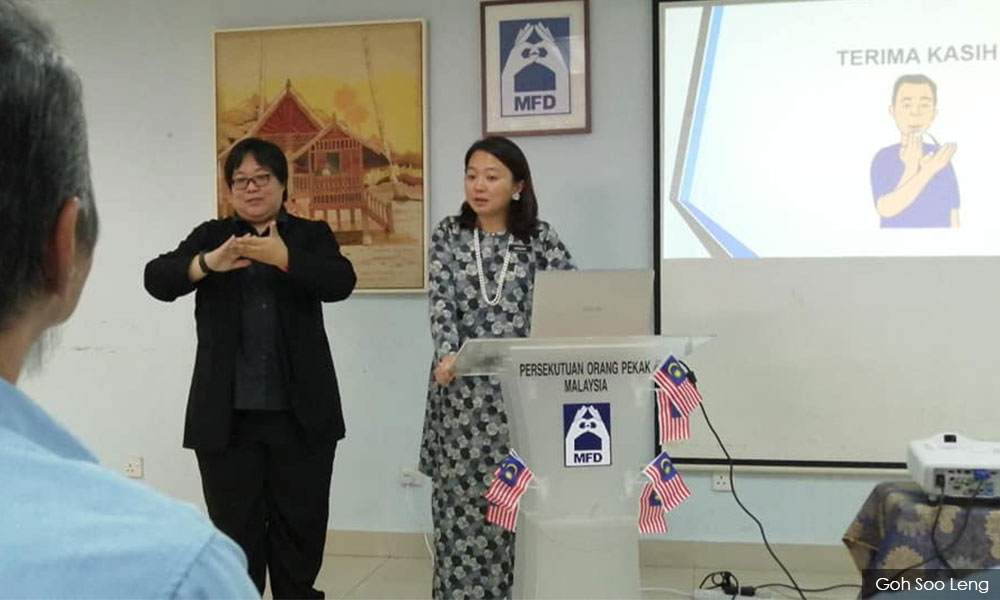
SIGN LANGUAGE IS NOT JUST A MOVEMENT OF HANDS. It's also a movement of the body and it is related to your facial expressions.
There is tremendous research being done, but I wouldn't see Artificial Intelligence replacing sign language interpreters in the next 30 years, because we still need human-to-human interaction for interpreting services.
AT AN EVENT, WE WILL IDENTIFY WHO ARE THE DEAF PARTICIPANTS AND IDENTIFY THEIR LEVELS. Sometimes, in one programme or event, we have people from multiple backgrounds, so if we are interpreting too high, those who are lower educated will be left behind.
But if you are interpreting or translating so low, those educated will also be left behind. So, we have to mix and match.
Interpreting a national conference and interpreting a local event are two different things.
WE, AT MFD, ARE WORKING HARD TO GET THE PUBLIC SERVICE DEPARTMENT TO RECOGNISE SIGN LANGUAGE INTERPRETERS AS A PROFESSION. That is what we want so that we can work in government offices, at counters and so that the deaf community do not have to rely on NGOs to provide the services.
It is the government's job to provide the service for the rakyat, not us.
If the government can do that, we can ask the hundreds of trainees to come back as the government is opening up job opportunities as civil servants.
But that is not the case for now. Sometimes, although we have five interpreters in Kuala Lumpur and Selangor, we still have no choice but to "import" interpreters from other states.
I WANT PEOPLE TO RESPECT OUR JOB AND OUR DUTY. We're not social workers or special education teachers.
Sometimes they're like, let's say a minister is giving a talk on stage, the organisers will ask us to stand a little bit further away from the minister.
Why?
Is it because he or she is a minister and so we cannot stand beside them?
Because the minister is giving a talk, the deaf participants will be looking at interpreters at the end of the stage, they will not be looking at the minister.
He or she is a VIP of the event so the interpreter needs to stand beside the speaker so that the audience can look at a speaker and the interpreter.
They treat us like pasu bunga, just for decoration, to look nice on stage.
I STOOD BESIDE THE PRIME MINISTER BEFORE. I stood beside two to three US ambassadors before because it is my job. I want people to look at us as professionals.
We have our code of ethics and we know what we need to do.
MALAYSIANSKINI is a series on Malaysians you should know.
PREVIOUSLY FEATURED
Fighting for respect in the shadows of the frontlines
Huzir’s love letter to Malaysia
RM12.50 / month
- Unlimited access to award-winning journalism
- Comment and share your opinions on all our articles
- Gift interesting stories to your friends
- Tax deductable
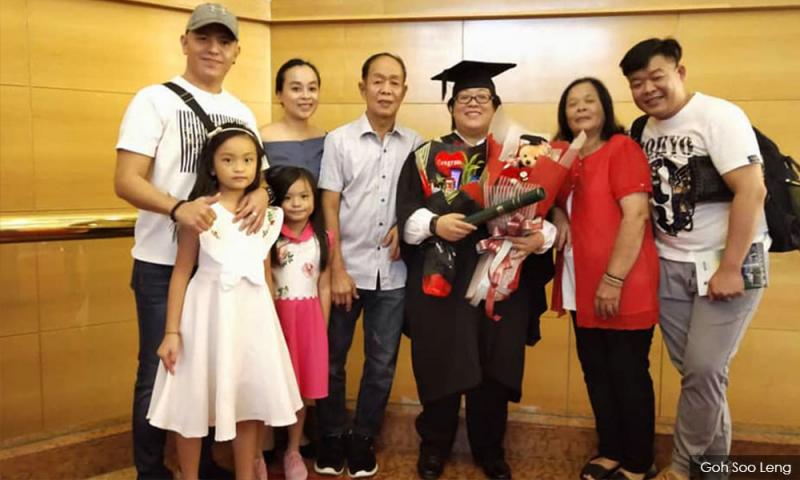
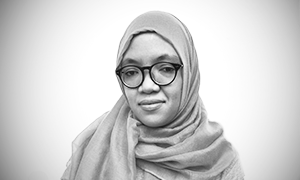 Alyaa Alhadjri
Alyaa Alhadjri